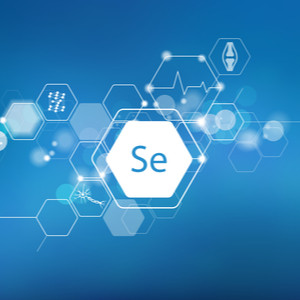
Humans unconsciously ingest small traces of selenium in their food intake. Selenium is found in legumes, cereals, but also in fish and meat. Despite the fact that selenium cannot be produced by the body itself, it is vital for our organism. Not only does this trace element have an antioxidant effect and binds heavy metals to itself, through these properties the trace element strengthens the body's own defences. But "a lot helps a lot" does not always apply. Selenium has a toxic effect in overdose over a longer period of time and should not be taken without consulting the doctor treating the patient.
A possible effectiveness of selenium against cancer was already established in the 1960s. Where soils were rich in selenium, significantly fewer inhabitants died and fell ill than in areas with selenium-poor soils. This led to further investigations of the trace element for its effectiveness.
Clear studies are not yet available
A positive efficacy of selenium has already been established in animal experiments, but the transferability of the results to humans is not yet guaranteed. Observational studies have shown that people with high concentrations of selenium were less likely to develop cancer and that cancer mortality was lower than in a control group. Some studies have shown a positive effect of selenium on certain types of cancer, while other types of cancer are said to remain unaffected. However, counter-studies could not confirm these positive properties of selenium. It only remains to observe future developments or results.
Selenium has been used for some time in cancer therapy in about 10% of patients. The fact is that there are only a few studies that could prove the effectiveness of selenium as a cancer remedy. However, there are very good indications for the successful use of selenium during ongoing radiotherapy and/or chemotherapy against the negative side effects and the associated increase in the quality of life of cancer patients.
Selenium in use - chemotherapy
The use of the preparation cisplatin achieves good results in cancer therapy, but is also associated with massive side effects. High-dose administration of 4 mg/d selenium reduced the negative effects on the blood (haematotoxic) and kidneys (nephrotoxic) of the patients, which meant that they had to undergo fewer to no follow-up treatments (such as blood transfusions). These results come from a cross-over study of 41 patients.
Patients with ovarian cancer experienced a dramatic improvement or alleviation of the side effects common with chemotherapy through long-term administration of selenium, resulting in an increased quality of life during the treatment period. Selenium has also been used with striking results in patients with lymphoma (non-Hodgkin's lymphoma). The use of sodium selenite promoted faster cell death (anostosis) of the diseased cells and noticeably supported the patients' heart function.
Selenium in use - radiotherapy
The treatments of head and neck tumours with additional administration of selenium were also recorded in a study. This proved that with simultaneous supplementation of selenium during radiotherapy, the usual swallowing disorders were drastically reduced.
Patients with uterine and cervical cancer who had the affected regions removed had a 50% better chance of not suffering from the usual diarrhoea if they received selenium during radiotherapy. Compared to the control group, it was found that the survival rate of the patients treated with selenium was about 13 % higher after ten years.
Selenium for prevention
Various studies on artificially created tumours led to the conclusion that selenium proteins inactivate cancer-causing substances. Even before the development of malignant cell forms, they attack oxygen radicals, which can trigger cell mutations. Even in the early stages of cancer, selenium can still have a positive effect on the course of the disease, although this depends on the trigger of the disease in question.
Selenium binds metals and converts them into metal selenides. This prevents metals such as arsenic, zinc, chromium, lead or cadmium from forming oxygen radicals and activating and supporting other possible cancer triggers. Selenium's slowing of cell growth also helps give the body time to repair damaged cells.
Too much selenium is harmful
Despite all the positive properties in favour of using selenium, it should be pointed out here again that an overdose of selenium can have toxic effects on the body. Self-therapy without consulting a doctor is strongly discouraged!
Negative effects of selenium on the human body have not yet been sufficiently scientifically documented. There is reason to believe that even small doses of selenium can cause serious side effects. It is suspected that the administration of selenium is directly related to diabetes and thyroid diseases. Selenosis (selenium poisoning from excessive intake) can lead to nail thickening, hair loss, skin changes, stomach pain with nausea and vomiting, skin irritation and even numbness and paralysis. Also, the storage of selenium in the body has not yet been sufficiently investigated. Only after positive long-term studies on the human organism can a generally valid statement be made on the pros and cons of selenium-supported cancer treatment.
Selenium supplementation under medical supervision
Since a direct connection between selenium deficiency and cancer has been proven several times, the best recommendation is to consult with the treating physician. He can determine whether the supplementary administration of selenium can have a positive effect on the cancer disease and which concentration, type and administration of selenium is necessary for this.
Good results have already been achieved in regulating side effects and making life easier for patients during therapy. This improvement of the general condition despite chemo- or radiotherapy should not be disregarded during treatment.
Patients who do not have to experience the sometimes massive side effects of a therapy can invest their energy in the fight against the underlying disease instead of enduring the side effects and develop more ambition to win and recover.
